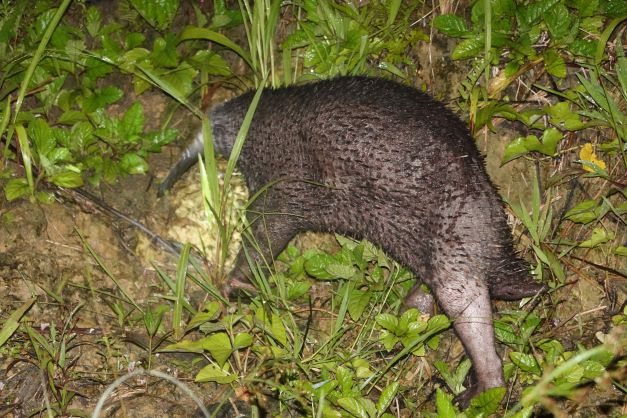The Irian porcupine or echidna (Zaglossus bruijnii) is a wild animal that is endemic to Papua and that has been categorized as a vulnerable species by the IUCN (International Union for the Conservation of Nature and Natural Resources), an international organization working in the field of nature conservation and the sustainable use of natural resources. The echidna is a monotreme or egg-laying mammal. However, during its various monitoring activities, the West Papua Natural Resources Conservation Agency (BBKSDA) has never managed to locate this animal, so its whereabouts cannot be ascertained with any certainty. Moreover, this rare species is believed to be in decline and is thus a vital subject for research.
In this regard, West Papua BBKSDA, supported by FORCLIME, conducted an Echidna survey in the BBKSDA working area of the Beriat Natural Tourism Park (TWA) from 17 October to 1 November 2022. The survey locations focused on three villages around the Beriat TWA area, namely Srer, Aibobor and Wehali, while the survey itself involved both interviews and direct observations.
Prior to conducting the survey, the personnel involved in the Echidna survey activities were first given rele-vant training. The training aimed to increase knowledge and skills as regards the inventorying of the Irian porcupine through direct observations and social surveys. Training for the Echidna identification survey was held from 14 to 16 October 2022 and involved the following participants:
- Six West Papua BBKSDA staff members.
- Four FORCLIME interns.
- One FORCLIME staff member.
- 10 participants from three survey location villages.
- Two participants from the University of Papua (Faculty of Teaching and Education and Diploma 3 Conservation at the Faculty of Forestry)
During the training, participants were presented with guidelines that addressed the search for the animals that were being surveyed, as well as further guidelines that addressed the conducting of field surveys or social observations and surveys. The observations were carried out through direct observation and trace identification techniques. Meanwhile, the social survey used the direct interview method, particularly with key informants from the relevant villages, for example, village heads, traditional leaders, religious leaders and hedgehog hunters. In addition, to these theoretical inputs, the training participants also engaged in practice sessions out in the field in Kampung Srer and TWA Beriat.
This activity was followed up with an analysis of the generated survey data, which has now been incorporated into a report. The results of the echidna survey will ultimately be used as a reference, not only by researchers but also by other stakeholders.
For more information, please contact:
Nita Yohana, Adviser for Sustainable Forest Management and Coordinator for West Papua Province
Mohammad Sidiq, Strategic Area Manager for Sustainable Forest Management and Coordinator for Papua and West Papua Provinces







